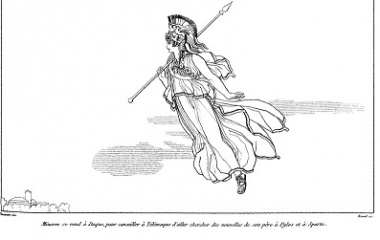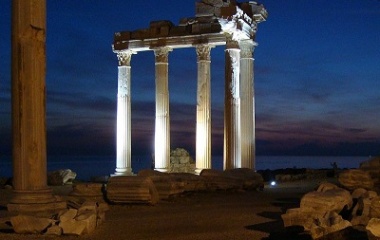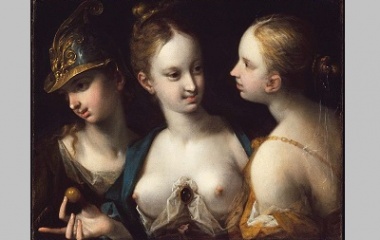- Pronunciation: a-THEE-nuh
- Origin: Greek
- Role: Goddess
- Symbols: Spear, Distaff
- Sibling: Dozens of half-siblings
Who Is Athena?
Athena is a well-recognized name in Greek mythology. She was the virgin goddess of reason, arts, literature and intelligence. She had a unique birth story and was known for her braveness in battles.
Role
Athena taught many skills to mankind. To the women, she taught sewing and weaving. She taught the men how to plant and grow gardens. She was known for her kindness and willingness to assist anyone in danger. She protected heroes as they engaged in battle and on the way home to safety.
Legends and Stories
Athena was a pillar in Greek mythology with many legends telling about her adventures. Here are some of the most popular.
Athena’s Birth
Athena’s birth story is quite unique. Her father, Zeus, was married to the daughter of Ocean, Metis. Metis became pregnant but Zeus had been warned by Earth that his wife would bear a son who would overthrow him from his throne. So Zeus swallowed his pregnant wife to prevent the son from being born.
Months later, he began to suffer from a serious headache. The pain was so bad he asked for help from Hephaestus, the craftsman god. Hephaestus used an ax to carefully open Zeus’ forehead. From the opening, a fully-grown woman emerged, suited already for battle. Zeus named her Athena. It is said that because the girl grew up without the presence of her mother, she took on more masculine traits, enabling her to develop her skills and become known as a warrior.
Beautiful Medusa
Many know the name Medusa but are unaware of her beginnings. Medusa was strikingly beautiful. She was kind but vain and boasted of her beauty whenever given the chance. She would tell people that her skin was more beautiful than freshly fallen white snow. She would say that her hair was brighter than the sun and her eyes greener than the sea. While all of this was true, Medusa was unknowingly laughed at in the town for her arrogance and boasting.
One day, Medusa decided to visit the Parthenon with her friends. It was her first time visiting the largest temple in Greece. She walked around and admired all the statues, including one of Athena. She noted out loud to her friends that while the statue was beautiful, it would be more beautiful if it was a statue of her. The priestesses at the temple gasped and visitors quickly began to file out. They knew that Athena would be angry with Medusa for her comments.
The temple was almost empty but Medusa didn’t notice at all. She was eventually alone but only for a moment. Athena made herself present and scolded the beautiful woman for her vanity, telling her that there was more to life than just looks. Medusa tried to argue with the goddess, telling her that her beauty served as an inspiration to others. But Athena would hear nothing of it. She told Medusa that one day, her beauty would fade away. She then decided Medusa was no longer worthy of her beauty and turned her into a monster with hissing snakes as hair and the body of a serpent.
Athena then told Medusa that she would be forever cursed. Anyone who looked her in the eyes would turn to stone forever. The same went for Medusa herself. If she ever looked in the mirror, she too would turn to stone. Athena then sent Medusa to live at the end of the earth with the gorgon sisters to save innocent people from being turned to stone.
The Contest
Cecrops, the king of a large city, decided to have a contest to find a patron deity to oversee his great city. There were two Olympian gods who were immediately interested in the position. Poseidon, the god of the seas, and Athena both approached Cecrops with their intentions. The king then asked them both to offer a gift with tremendous value to help the city and its people.
Poseidon went first. He struck the ground with his trident and created a deep well. Water immediately sprung from the well and into the town. Poseidon had hoped to provide the people with an everlasting water supply but the water proved to be salty and not useful for drinking or tending crops.
It was then Athena’s turn. She came forward and stabbed her spear into the ground. She then knelt down and placed an olive branch in the narrow hole in the earth. She told Cecrops that this branch would grow into a healthy olive tree, a sign of peace and prosperity for the people of his city.
The king was truly impressed with Athena’s gift and chose her to claim the city. The city was then named after her and became known as Athens. She graciously accepted the job and promised to provide for the city’s people as best as she could. But Poseidon was jealous and cursed the city with poor water. The city would be unable to keep up on its water supply for drinking and gardening. To this day, droughts are blamed on Poseidon’s curse on the city.
Family
Athena was the daughter of Zeus. She did not grow up with a mother. She had dozens of half-siblings but was her father’s favorite by far. She never married or had children of her own.
Appearance
Athena is usually shown as a tall and thin woman in artistic representations. Her sparkling eyes are a combination of blue and green and she’s almost always wearing her armor and recognizable golden helmet. Even though she is dressed for battle, she still shows her womanly figure and appeal.
Symbology
Athena is associated with courage and braveness. Her materialistic symbols include her spear, the distaff and a goatskin shield called the aegis. She fastened the head of the gorgon Medusa to the shield to scare others in battle. She is also associated with the olive tree and owl because of her wisdom.










